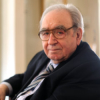Robert Fogel

Robert Fogel
Robert William Fogelwas an American economic historian and scientist, and winnerof the 1993 Nobel Memorial Prize in Economic Sciences. As of his death, he was the Charles R. Walgreen Distinguished Service Professor of American Institutions and director of the Center for Population Economics at the University of Chicago's Booth School of Business. He is best known as an advocate of new economic history– the use of quantitative methods in history...
NationalityAmerican
ProfessionHistorian
Date of Birth1 July 1926
CountryUnited States of America